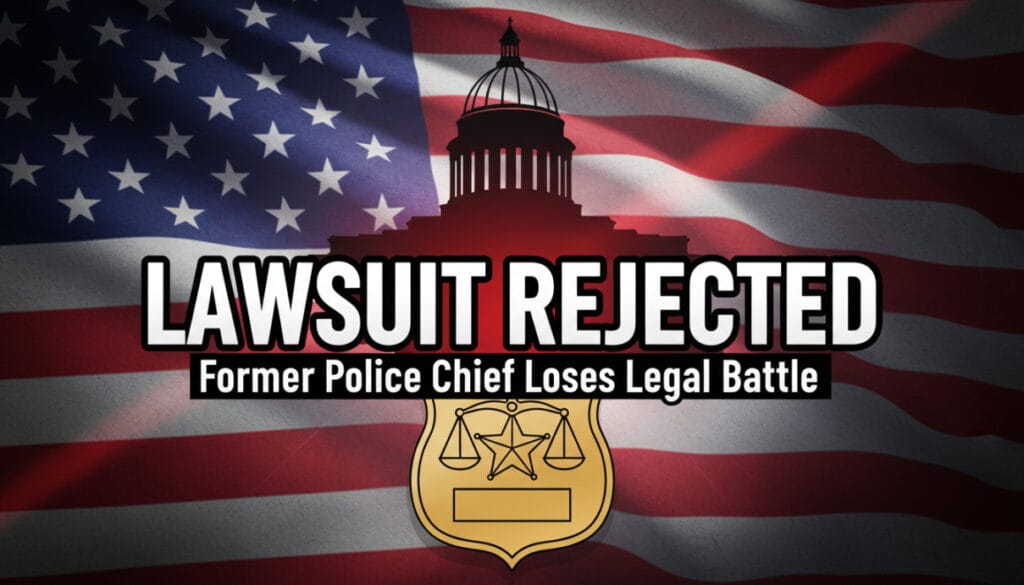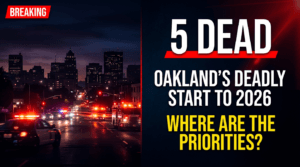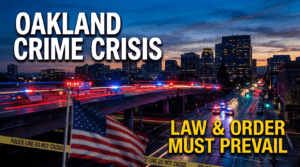Oakland’s Former Top Cop Loses Legal Battle: Court Rejects Armstrong’s Whistleblower Claims Against City

The legal saga surrounding former Oakland Police Chief LeRonne Armstrong’s controversial firing has reached a decisive turning point, as a court has rejected his whistleblower lawsuit against the city. The ruling represents a significant victory for Mayor Sheng Thao’s administration and closes another chapter in what has been one of Oakland’s most contentious political battles in recent years.
The Rise and Fall of a Police Chief
LeRonne Armstrong’s journey from celebrated police reformer to embattled former chief reads like a cautionary tale of Oakland politics. Appointed in 2021 amid nationwide calls for police reform, Armstrong was initially hailed as a progressive choice who could bridge the gap between community concerns and law enforcement needs. His appointment came at a critical time when Oakland, like many American cities, was grappling with questions about police accountability, community relations, and public safety.
Armstrong’s tenure began with considerable promise. As an Oakland native who had risen through the ranks of the department, he brought both insider knowledge and community credibility to the role. His supporters viewed him as someone who understood the complexities of policing in a diverse, urban environment while remaining committed to necessary reforms.
However, Armstrong’s relationship with Mayor Sheng Thao would prove to be his professional undoing. The tension between the two leaders became increasingly apparent as they clashed over police department policies, budget allocations, and strategic direction. What began as policy disagreements eventually escalated into a full-blown political confrontation that would ultimately cost Armstrong his job.
The Controversial Firing
Mayor Thao’s decision to terminate Armstrong sent shockwaves through Oakland’s political establishment and law enforcement community. The firing was not merely an administrative action but a bold political statement that reflected the mayor’s vision for the city’s future direction on public safety matters.
The circumstances surrounding Armstrong’s dismissal were particularly contentious. Critics argued that the mayor’s actions were premature and politically motivated, while supporters contended that new leadership was necessary to implement the administration’s public safety agenda effectively. The debate highlighted the inherent tensions in Oakland politics, where progressive ideals often clash with practical governance challenges.
Armstrong’s supporters rallied to his defense, arguing that his firing represented a step backward for police reform efforts in Oakland. They contended that Armstrong had been making genuine progress in improving community-police relations and that his removal would undermine ongoing reform initiatives. Community leaders, police officers, and political allies voiced their concerns about the decision’s timing and rationale.
The Legal Challenge
Following his termination, Armstrong decided to fight back through the courts, filing a whistleblower lawsuit that alleged his firing was retaliatory and violated his legal protections. The lawsuit represented Armstrong’s attempt to clear his name and potentially secure financial compensation for what he viewed as wrongful termination.
Whistleblower lawsuits are notoriously difficult to prove, requiring plaintiffs to demonstrate that they were fired specifically for reporting misconduct or illegal activities. These cases often hinge on complex questions of motivation, timing, and evidence that can be challenging to establish in court.
Armstrong’s legal team argued that his firing was directly related to his efforts to expose wrongdoing or resist improper pressure from the mayor’s office. They contended that Armstrong had been fulfilling his professional obligations and that his termination was an act of retaliation for his refusal to compromise his principles or professional standards.
Court’s Decisive Ruling
The court’s rejection of Armstrong’s whistleblower claims represents a clear legal victory for Mayor Thao and the city of Oakland. The ruling that Armstrong’s claims “do not rise” to the level required for a whistleblower lawsuit suggests that the court found insufficient evidence to support his allegations of retaliation.
This legal language is significant because it indicates that the court determined Armstrong failed to meet the basic threshold requirements for a whistleblower claim. Such requirements typically include demonstrating that the plaintiff engaged in protected activity, that they suffered adverse employment action, and that there was a causal connection between the protected activity and the adverse action.
The court’s decision effectively validates the mayor’s authority to make personnel decisions within her administration, even when those decisions are controversial or politically charged. It reinforces the principle that elected officials have broad discretion in selecting their key administrators and that disagreements over policy or management style do not automatically constitute grounds for legal action.
Political Implications
The lawsuit’s rejection has significant implications for Oakland’s political landscape. For Mayor Thao, the ruling provides legal vindication for what was arguably one of her most controversial decisions. It allows her administration to move forward without the cloud of ongoing litigation and demonstrates that her personnel decisions can withstand legal scrutiny.
The ruling also sends a message to other city employees and officials about the limits of legal challenges to administrative decisions. While whistleblower protections remain important safeguards against genuine retaliation, the court’s decision suggests that not every employment dispute rises to the level of a whistleblower claim.
For Armstrong, the legal defeat represents a significant setback in his efforts to challenge his firing and restore his reputation. The court’s determination that his claims lacked merit may make it more difficult for him to pursue future opportunities in law enforcement or to maintain his narrative about the circumstances of his termination.
Broader Context of Oakland Politics
This legal battle reflects broader tensions within Oakland’s political ecosystem. The city has long struggled to balance competing demands for public safety, police reform, and community accountability. These tensions often play out in personnel decisions, budget allocations, and policy debates that can become highly polarized.
The Armstrong case also highlights the challenges facing mayors and police chiefs in modern American cities. The relationship between elected officials and law enforcement leaders is inherently complex, involving questions of civilian oversight, professional autonomy, and political accountability that can be difficult to navigate successfully.
Looking Forward
With the legal challenge now resolved, both Mayor Thao and the city of Oakland can focus on moving forward with their public safety agenda. The ruling provides closure to a contentious chapter and allows city leadership to concentrate on addressing Oakland’s ongoing challenges without the distraction of prolonged litigation.
For the Oakland Police Department, the resolution of this legal dispute may provide an opportunity for stability and renewed focus on community policing initiatives. The department has faced numerous challenges in recent years, and resolving leadership questions may help restore confidence and effectiveness.
The case serves as a reminder that in the complex world of municipal politics, legal remedies are not always available for employment disputes, even when they involve high-profile positions and controversial decisions. It underscores the importance of political relationships, effective communication, and shared vision between elected officials and their key administrators.
As Oakland continues to grapple with questions of public safety, police reform, and community relations, the resolution of this legal challenge marks the end of one chapter while the larger story of the city’s evolution continues to unfold.













